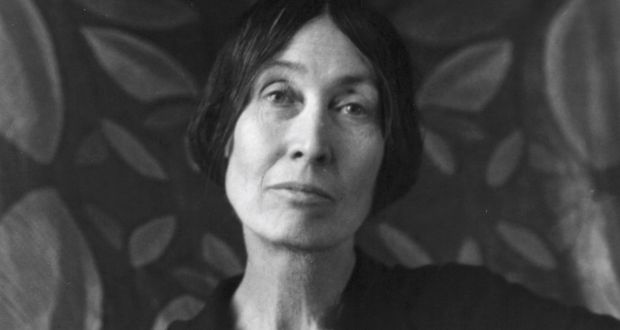Lola Ridge, 1873–1941
Modernist poet, anarchist, labour activist
Rose Emily Ridge was born in Dolphin’s Barn, Dublin in 1873. Her medical student father died when she was three, so her mother emigrated to Australia, before moving on to New Zealand. Her mother remarried in 1880 to a Scottish miner and the family lived in a three-roomed shack on the Hokitikagold fields, among Maori and European and Chinese immigrants.
At 22, Ridge married a gold-mine manager in Kanieri, Hokitika. Their first son, born in 1896, died of bronchitis in infancy; their second, Keith, was born in 1900. In 1901 and 1902, under the name ‘Lola’, she published her first poems, ‘A Deserted Diggings, Maoriland’ and ‘Driving the Cattle Home’ in Bulletin and Otago Witness. This was a crossroads moment, when she decided to break with social convention to become an artist.
In 1903, she left her husband and took her son to her mother in Sydney, where she studied art at the Académie Julienne and wrote her first book, Verses. In 1907, her mother and stepfather both died, and she left for San Francisco. Her biographer, Daniel Tobin, understands her many migrations–from Ireland to Australia, to New Zealand, to Australia, to San Francisco, to New York City–as the means by which she reinvented herself. Before leaving San Francisco for New York in 1908, she left her son in an orphanage.
The move to New York saw the birth of Lola Ridge, modernist poet, utopian anarchist and labour activist, claiming to be ten years younger than she was. To support herself, she worked as an illustrator, factory worker, poet, and model. Her first book of American poems,The Ghetto and Other Poems, was published in 1918, and in the following year she gave a series of lectures around the Mid-West on‘Women and the Creative Will’. Throughout the 1920s, she published radical poetry in support of communism and the Soviet Union, including the poem ‘Bolshiviki’ in The New York Post Literary Review (1922), and the book Red Flag (1927). She followed her own maxim: ‘Write anything that burns you.’
Her reputation as a poet developed, and she was twice awarded the Shelley Memorial Award for Poetry (1935, 1936) and was awarded a Guggenheim Poetry Fellowship (1935). In 1927, she was arrested in Boston for protesting the execution of two anarchists. She was devoted to radical politics, and dedicated one of her poems to the Irish labour leader, James Larkin. She published five books of poems that, as a whole, deal with representing the harsh realities of life on the New Zealand goldfields and in the immigrant neighbourhoods of New York’s Lower East Side, while also attempting to reconcile her own radical politics and spirituality. This reflects her own life story, her political radicalism, and the ethereal image she shaped for herself.
A well-recognised feminist poet and modernist in her own lifetime, she has since been largely forgotten, possibly in part due to the inhospitality of mid-twentieth century America towards socialists and communists. Despite this neglect, she remains significant for the courage with which she addressed social issues in her writing and for her pivotal position among the modernist and women writers of twentieth-century America.
Sources:To the Many: Collected Early Works by Lola Ridge,ed.Daniel Tobin (Little Island Press, 2018);Light in Hand:Selected Early Poems of Lola Ridge,ed.Daniel Tobin (Quale Press, 2007); Terese Svoboda, Anything that Burns You:The Dialect of Modernism (Scheffer Press, 2016).
Research by Dr Angela Byrne, DFAT Historian-in-Residence at EPIC The Irish Emigration Museum. Featured in the exhibition 'Blazing a Trail: Lives and Legacies of Irish Diaspora Women', a collaboration between Herstory, EPIC The Irish Emigration Museum and the Department of Foreign Affairs and Trade.

